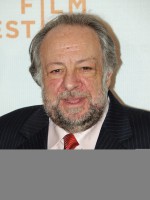David Mamet is a Actor, Director, Scriptwriter and Associate Producer American born on 30 november 1947 at Chicago (USA)

David Alan Mamet (/ˈmæmɨt/; born November 30, 1947) is an American playwright, essayist, screenwriter, and film director.
As a playwright, Mamet has won a Pulitzer Prize and received Tony nominations for Glengarry Glen Ross (1984) and Speed-the-Plow (1988). As a screenwriter, he has received Oscar nominations for The Verdict (1982) and Wag the Dog (1997). Mamet's books include: The Old Religion (1997), a novel about the lynching of Leo Frank; Five Cities of Refuge: Weekly Reflections on Genesis, Exodus, Leviticus, Numbers and Deuteronomy (2004), a Torah commentary with Rabbi Lawrence Kushner; The Wicked Son (2006), a study of Jewish self-hatred and antisemitism; Bambi vs. Godzilla, a commentary on the movie business; The Secret Knowledge: On the Dismantling of American Culture (2011), a commentary on cultural and political issues; and Three War Stories (2013), a trio of novellas about the physical and psychological effects of war.
Mamet's feature films that he both wrote and directed include Redbelt (2008), The Spanish Prisoner (1997), House of Games (1987) (which won Best Film and Best Screenplay awards at the 1987 Venice Film Festival and "Film of the Year" for the 1989 London Critics Circle Film Awards), Spartan (2004), Heist (2001), State and Main (2000) (Winner of a Best Acting - Ensemble award from the National Board of Review), The Winslow Boy (1999), Oleanna (1994), Homicide (1991) (nominated for the Palme d'Or at 1991 Cannes Film Festival and won a "Screenwriter of the Year" award for Mamet from the London Critics Circle Film Awards and Best Cinematography for Roger Deakins from the Los Angeles Film Critics Association Awards), Things Change (1988) (which won the Volpi Cup for Best Actor at 1988 Venice Film Festival for Don Ameche and Joe Mantegna), and most recently the 2013 HBO film Phil Spector, starring Al Pacino as Spector with Helen Mirren and Jeffrey Tambor.
Mamet has also written the screenplays for such films as The Verdict (1982), directed by Sidney Lumet, The Postman Always Rings Twice (1981), directed by Bob Rafelson, The Untouchables (1987) directed by Brian De Palma, Hoffa (1992), Ronin (1998), Wag The Dog (1997), The Edge (1997), and Hannibal (2001).
Mamet was also the creator, executive producer, and frequent writer for the TV show The Unit.
Ses textes sont connus pour leurs dialogues crus, parfois vulgaires, mais néanmoins intelligents, ainsi que pour leur exploration de la masculinité. Il a reçu un Prix Pulitzer et a été nommé aux Tony Award pour Glengarry Glen Ross (pièce créée en 1983), et aux Oscars comme scénariste du Le Verdict (1982) et de Des hommes d'influence (Wag the Dog, 1997).
Il écrit aussi sur le judaïsme et la culture juive, ses livres les plus récents dans ce domaine étant The Old Religion (1997), un roman sur le lynchage de Leo Frank, accusé d'avoir violé et tué une jeune fille dans son usine (pour David Mamet, une version moderne de l'accusation de crime rituel contre les Juifs), Five Cities of Refuge: Weekly Reflections on Genesis, Exodus, Leviticus, Numbers and Deuteronomy (2004), une série de sermons sur la section hebdomadaire de la Torah, écrit en collaboration avec le rabbin réformé Lawrence Kushner , et The Wicked Son (2006), une étude sur la « haine de soi » juive et l'antisémitisme.
En France, son théâtre est adapté par le dramaturge Pierre Laville, dont il est l'adaptateur aux États-Unis.
Il est brièvement apparu dans un épisode des Simpson.
Il apparaît également dans le onzième épisode des Griffin.
Source : Wikidata
David Mamet

- Infos
- Photos
- Best films
- Family
- Characters
- Awards
Birth name David Alan Mamet
Nationality USA
Birth 30 november 1947 (77 years) at Chicago (USA)
Awards Pulitzer Prize for Drama
Nationality USA
Birth 30 november 1947 (77 years) at Chicago (USA)
Awards Pulitzer Prize for Drama
As a playwright, Mamet has won a Pulitzer Prize and received Tony nominations for Glengarry Glen Ross (1984) and Speed-the-Plow (1988). As a screenwriter, he has received Oscar nominations for The Verdict (1982) and Wag the Dog (1997). Mamet's books include: The Old Religion (1997), a novel about the lynching of Leo Frank; Five Cities of Refuge: Weekly Reflections on Genesis, Exodus, Leviticus, Numbers and Deuteronomy (2004), a Torah commentary with Rabbi Lawrence Kushner; The Wicked Son (2006), a study of Jewish self-hatred and antisemitism; Bambi vs. Godzilla, a commentary on the movie business; The Secret Knowledge: On the Dismantling of American Culture (2011), a commentary on cultural and political issues; and Three War Stories (2013), a trio of novellas about the physical and psychological effects of war.
Mamet's feature films that he both wrote and directed include Redbelt (2008), The Spanish Prisoner (1997), House of Games (1987) (which won Best Film and Best Screenplay awards at the 1987 Venice Film Festival and "Film of the Year" for the 1989 London Critics Circle Film Awards), Spartan (2004), Heist (2001), State and Main (2000) (Winner of a Best Acting - Ensemble award from the National Board of Review), The Winslow Boy (1999), Oleanna (1994), Homicide (1991) (nominated for the Palme d'Or at 1991 Cannes Film Festival and won a "Screenwriter of the Year" award for Mamet from the London Critics Circle Film Awards and Best Cinematography for Roger Deakins from the Los Angeles Film Critics Association Awards), Things Change (1988) (which won the Volpi Cup for Best Actor at 1988 Venice Film Festival for Don Ameche and Joe Mantegna), and most recently the 2013 HBO film Phil Spector, starring Al Pacino as Spector with Helen Mirren and Jeffrey Tambor.
Mamet has also written the screenplays for such films as The Verdict (1982), directed by Sidney Lumet, The Postman Always Rings Twice (1981), directed by Bob Rafelson, The Untouchables (1987) directed by Brian De Palma, Hoffa (1992), Ronin (1998), Wag The Dog (1997), The Edge (1997), and Hannibal (2001).
Mamet was also the creator, executive producer, and frequent writer for the TV show The Unit.
Biography
Les parents de David Mamet sont des Juifs originaires de Russie. Son père est un avocat spécialisé en droit du travail et sa mère, enseignante. David Mamet a étudié au collège Goddard, dans le Vermont.Ses textes sont connus pour leurs dialogues crus, parfois vulgaires, mais néanmoins intelligents, ainsi que pour leur exploration de la masculinité. Il a reçu un Prix Pulitzer et a été nommé aux Tony Award pour Glengarry Glen Ross (pièce créée en 1983), et aux Oscars comme scénariste du Le Verdict (1982) et de Des hommes d'influence (Wag the Dog, 1997).
Il écrit aussi sur le judaïsme et la culture juive, ses livres les plus récents dans ce domaine étant The Old Religion (1997), un roman sur le lynchage de Leo Frank, accusé d'avoir violé et tué une jeune fille dans son usine (pour David Mamet, une version moderne de l'accusation de crime rituel contre les Juifs), Five Cities of Refuge: Weekly Reflections on Genesis, Exodus, Leviticus, Numbers and Deuteronomy (2004), une série de sermons sur la section hebdomadaire de la Torah, écrit en collaboration avec le rabbin réformé Lawrence Kushner , et The Wicked Son (2006), une étude sur la « haine de soi » juive et l'antisémitisme.
En France, son théâtre est adapté par le dramaturge Pierre Laville, dont il est l'adaptateur aux États-Unis.
Il est brièvement apparu dans un épisode des Simpson.
Il apparaît également dans le onzième épisode des Griffin.
Best films
Usually with
Filmography of David Mamet (34 films)
Actor

Genres Documentary
Themes Films about writers
Actors Gore Vidal, Burr Steers, Tim Robbins, Sting, David Mamet, Norman Mailer
Rating76%





The film is a commentary on Gore Vidal's professional and personal life, and the impact he had in art and politics. It includes exclusive interviews with Vidal, as well as figures such as Burr Steers and Christopher Hitchens.

Origin USA
Genres Documentary
Themes Films about magic and magicians
Actors Ricky Jay, Dick Cavett, David Mamet
Roles Himself
Rating70%





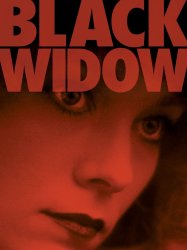
Black Widow (1987)
, 1h40Directed by Bob Rafelson
Origin USA
Genres Thriller, Crime
Themes Medical-themed films, Seafaring films, Transport films, Serial killer films, Films about psychiatry, Children's films
Actors Debra Winger, Theresa Russell, Sami Frey, Dennis Hopper, Rutanya Alda, Terry O'Quinn
Roles Herb
Rating63%





The story centers on two women. Catherine (Theresa Russell) is a psychopathic femme fatale whose true name and motivation are never known. She preys on wealthy middle-aged men, seducing them into marriage and then fatally poisoning them. Each death is misdiagnosed as Ondine's curse, a condition by which seemingly healthy middle-aged men die in their sleep. Justice Department agent Alexandra "Alex" Barnes (Debra Winger) stumbles onto the first murder while investigating another case. As Alex delves further into the case, she uncovers a pattern which she believes ties the same woman to several similar murders.
Director

Phil Spector (2013)
, 1h32Directed by David Mamet
Origin USA
Genres Drama, Biography, Crime
Themes Films about music and musicians, Musical films
Actors Al Pacino, Helen Mirren, Chiwetel Ejiofor, Jeffrey Tambor, Rebecca Pidgeon, James Tolkan
Rating61%





Le célèbre producteur de musique Phil Spector est arrêté pour le meurtre de Lana Clarkson. Il est défendu par l'avocate Linda Kenney Baden, qui souffre d'une pneumonie…
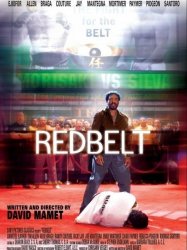
Redbelt (2008)
, 1h40Directed by David Mamet
Genres Drama, Thriller, Martial arts, Action, Adventure, Martial arts
Themes Sports films, Martial arts films, Combat libre
Actors Chiwetel Ejiofor, Tim Allen, Emily Mortimer, Alice Braga, Rodrigo Santoro, Joe Mantegna
Rating66%





While closing his Brazilian Jiu-Jitsu studio one evening, martial arts teacher Mike Terry (Chiwetel Ejiofor) is approached by attorney Laura Black (Emily Mortimer), who is seeking the owner of the vehicle she accidentally sideswiped. Off-duty police officer Joe Collins (Max Martini), who was receiving a private lesson from Mike, sees that Laura is distressed and tries to take her coat. Startled, Laura grabs Joe's gun and fires it; shattering the studio's front window. To avoid having Laura charged with attempted murder, Mike and Joe agree to conceal the event.
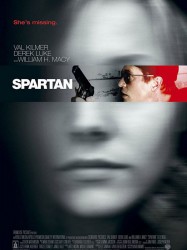
Spartan (2004)
, 1h46Directed by David Mamet
Origin USA
Genres Drama, Thriller, Action, Crime
Themes Spy films, Political films
Actors Val Kilmer, Derek Luke, William H. Macy, Kristen Bell, Tia Texada, Ed O'Neill
Rating64%





Robert Scott is a former Force Recon Master Gunnery Sergeant, acting as a selection cadre member for Delta Force. While observing an exercise designed to evaluate Delta candidates, Scott meets a recruit, Curtis, as well as Sergeant Jacqueline Black, a knife-fighting instructor.

Heist (2001)
, 1h49Directed by David Mamet
Origin USA
Genres Drama, Thriller, Action, Crime, Politic
Themes Heist films, Gangster films, Escroquerie
Actors Gene Hackman, Danny DeVito, Delroy Lindo, Sam Rockwell, Rebecca Pidgeon, Ricky Jay
Rating64%





Joe Moore runs a ring of professional thieves, which includes Bobby Blane, Don "Pinky" Pincus and Joe's wife Fran. During a daylight robbery of a New York City jewelry store, Joe's face is captured by a security camera after he takes off his mask in an attempt to con/distract the store's last remaining employee. As both the picture and a witness can identify him, Joe chooses to retire from crime and plans to disappear on his sail boat with his wife, living off their share of the heist.

State and Main (2000)
, 1h45Directed by David Mamet
Origin France
Genres Drama, Comedy, Comedy-drama
Themes Films about films, Mise en scène d'un scénariste
Actors Alec Baldwin, Charles Durning, Clark Gregg, Philip Seymour Hoffman, Patti LuPone, William H. Macy
Rating66%





Havoc is wrought on the inhabitants of a small New England town by a troubled film production. After the leading man's penchant for underage girls gets them banished from their New Hampshire location, the crew relocates to the small town of Waterford, Vermont, to finish shooting "The Old Mill".
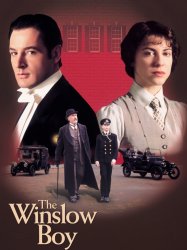
The Winslow Boy (1999)
, 1h44Directed by David Mamet
Origin United-kingdom
Genres Drama
Themes Films based on plays
Actors Nigel Hawthorne, Rebecca Pidgeon, Jeremy Northam, Gemma Jones, Aden Gillett, Sarah Flind
Rating72%





It is Christmas 1911 and Arthur Winslow, a London banker, is making final preparations for a dinner to seal the engagement between his daughter Catherine, an outspoken supporter of the controversial cause of women's suffrage, and Captain John Watherstone. The family and guests are toasting the upcoming marriage when Arthur discovers that his youngest son Ronnie, a 13-year-old cadet at the Royal Naval College, Osborne, is unexpectedly home. Ronnie has been accused of the theft of a postal order. An internal enquiry, conducted without notice to his family and without benefit of representation, finds him guilty and Mr. Winslow is "requested to withdraw" his son from the college (the formula of the day for expulsion). Ronnie proclaims his innocence and his father believes him—enough so that he demands an apology from the College. When the college refuses to reinstate Ronnie, Arthur decides to take the matter to court. With the help of his daughter and Desmond Curry, a solicitor and friend of the family, Mr. Winslow decides to hire the most highly sought after barrister in England at the time, Sir Robert Morton, known also to be a shrewd opposition Member of Parliament.
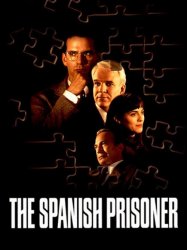
The Spanish Prisoner (1997)
, 1h46Directed by David Mamet
Origin USA
Genres Drama, Thriller, Crime
Themes Seafaring films, Transport films, Heist films, Gangster films, Escroquerie
Actors Campbell Scott, Steve Martin, Rebecca Pidgeon, Ricky Jay, Ben Gazzara, Felicity Huffman
Rating71%





Corporate engineer Joe Ross (Campbell Scott) has invented a very lucrative, very secret industrial process. While on a corporate retreat at the resort island of St. Estèphe, he meets a wealthy stranger, Jimmy Dell (Steve Martin), and attracts the interest of one of the company's new secretaries, Susan Ricci (Rebecca Pidgeon).
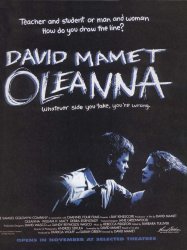
Oleanna (1994)
, 1h29Directed by David Mamet
Origin USA
Genres Drama
Themes Films about education
Actors William H. Macy
Rating64%





Étudiante perturbée, Carol souhaite confier ses problèmes à John, son professeur. La discussion dérape et la jeune femme en vient à accuser son professeur de harcèlement sexuel. Inquiet pour sa réputation, John refuse de la laisser partir et la situation dégénère...
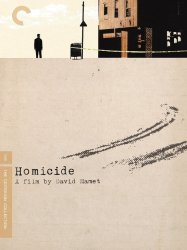
Homicide (1991)
, 1h42Directed by David Mamet
Origin USA
Genres Drama, Thriller, Crime
Actors Joe Mantegna, William H. Macy, Rebecca Pidgeon, J. J. Johnston, Lionel Mark Smith, Keith Johnson
Rating68%





Bobby Gold (Mantegna) is an inner-city homicide detective on the trail of Robert Randolph (Rhames), a drug-dealer and cop-killer on the FBI's Ten Most Wanted List. En route to nab an accomplice of Randolph, Gold and his partner Tim Sullivan (Macy) happen upon a murder scene: the elderly Jewish owner of a candy store in a black ghetto has been gunned down, reportedly for a fortune hidden in her basement. The deceased woman's son, a doctor, uses his clout to have Gold assigned to the case in the belief that Gold, himself Jewish, might be empathetic to his plight. Gold, however, seems to disregard his ethnicity, and beyond that, he's irritated about being pulled off a much higher-profile case. Ultimately, though, this is offset by interactions with members of the Jewish community that play on Gold's feelings of inadequacy and incapability of fitting in.
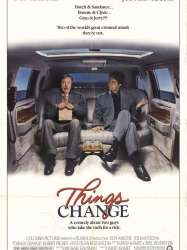
Things Change (1988)
, 1h40Directed by David Mamet
Origin USA
Genres Drama, Thriller, Comedy, Comedy-drama, Action, Crime
Actors Joe Mantegna, Don Ameche, Robert Prosky, Mike Nussbaum, William H. Macy, Ricky Jay
Rating69%





Gino, a humble shoe-shiner in Chicago, is approached by a Mafia don who offers him a large sum of money to take the rap for a murder committed by another gangster. Gino agrees, planning to buy a fishing boat with the money he will earn after a three-year sentence.
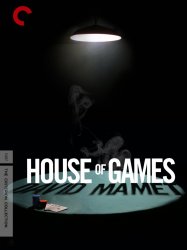
House of Games (1987)
, 1h42Directed by David Mamet
Genres Drama, Thriller, Crime
Themes Heist films
Actors Lindsay Crouse, Joe Mantegna, Lilia Skala, Ricky Jay, Mike Nussbaum, J. T. Walsh
Rating71%





Margaret Ford (Lindsay Crouse) is a psychiatrist who has achieved success with her recently published book, but who feels unfulfilled. During a session one day, Billy Hahn (Steven Goldstein), a patient, informs her that his life is in danger because he owes money to a criminal figure named Mike (Joe Mantegna) and brandishes a gun, threatening to kill himself. Margaret persuades him to surrender the chrome weapon to her and promises that she will help.
 Connection
Connection







